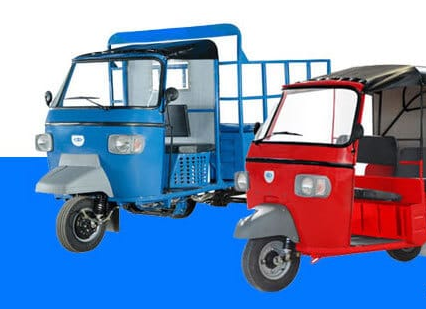New Delhi: After four- and two-wheelers, India is eyeing to turn a significant part of 6 million three-wheelers on roads into electric vehicles as it chases the ambitious target of converting 30 per cent of all wheels on roads into electric by 2030.
From freight loaders to garbage disposal vans, going electric helps three-wheelers save on the running cost of the vehicles. Also unlike four-wheelers, three-wheelers offer easy options of replacing discharged batteries with charged ones, helping save on the time taken to charge.
State-run Convergence Energy Services Ltd (CESL), a wholly-owned subsidiary of Energy Efficiency Services Ltd, has floated a Rs 3,000 crore tender to buy one lakh electric three-wheelers for different use categories such as garbage disposal, freight loaders, food and vaccine transport and passenger autos, its MD and CEO Mahua Acharya said.
“Before floating the tender, we launched a public exercise for demand aggregation. So we got commitments from financiers, fleet aggregators and others such as states that have funds under Swatch Bharat Mission, for about 85,000 (three-wheelers). And so we kept a margin of an additional 15,000 and floated a tender to buy 1 lakh electric three-wheelers,” she said.
While buying individually may not help get the best of rates, procuring on such a large scale helps in getting a better price, she said adding the commitments are now being converted into firm buy orders.
However, the ability of manufacturers to deliver 1 lakh electric three-wheelers in the promised 18 months remains a concern, she said, adding 20 OEMs participated in the pre-bid conference.
“Of the 6 million three-wheelers on roads, EV is a very small percentage. Auto rickshaw is the biggest market. Then there is the freight and delivery business which has gone through the roof after Covid struck. They want to buy the cheapest ride and the cheapest cost of delivery is met by electric,” she said going electric offers the best option where three-wheelers are used for livelihood earning.
Another big market is garbage loaders. Also, there are specialised products such as coolers for vegetables and vaccines. States and municipalities are also coming up with requirements for three-wheeler garbage loaders.
Acharya said there are 5.5 lakh electric three-wheelers (E3W) on the road.
Earlier this month, CESL launched a scheme for the sale of E2W to government employees in Kerala where the state government has directed all departments to switch to electric vehicles instead of purchasing new fuel-based ones.
E2W are available on CESL’s app to purchase at rates negotiated by the agency, she said.
“After accounting for central government subsidy, the price of E2W comes to Rs 55,000 to Rs 1.3 lakh. If states give subsidies, the prices will come down further. At this, price is very competitive (compared to fossil-fuel-based two-wheelers),” she said.
However, charging infrastructure is a problem as not enough land is available to set up such stations.
“The government is pushing it (setting up of charging infrastructure). Policy signals are clear. There is a subsidy. But we ourselves have managed to meet less than 25 per cent of the target. We have been able to set up only 250 charging stations,” she said.
The land is the biggest issue with municipalities “negotiating endlessly”. Also, the absence of large-capacity transformers is hindering the business.
“This business is loss-making and if I have to put transformer, we go deep into the red. And unless the transformer is there, you can’t charge,” she said.
On top of this, capacity utilisation of existing charging stations was only 15 per cent. Net utilisation after considering downtime is under 10 per cent, she said adding 30-35 per cent of capacity utilisation makes the charging station economically viable.
“Nobody has cracked the code for charging stations, where to locate these. Should it be at parking lots or at cinema halls, or gas stations or malls, no one really knows,” she said.
On the E3W tender, Acharya said original equipment manufacturers (OEMs) have been invited to provide quotations for electric three-wheelers.
After procurement of these electric vehicles, the CESL will lease them to entities that wish to avail of such leasing services.
The demand for E3W is coming from cities that aim to transform their garbage collection fleet from fossil fuel to electric power or add a new fleet that is greener and cheaper to operate. A big proportion of the tender comprises demand for vehicles that will be used to deliver vaccines and provide employment.
PTI
